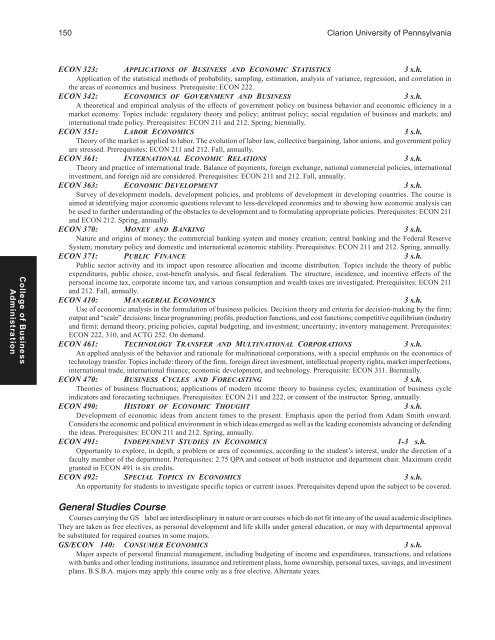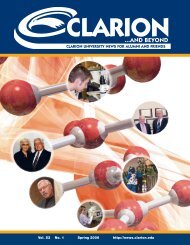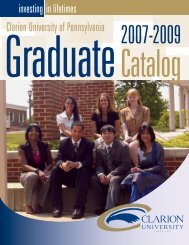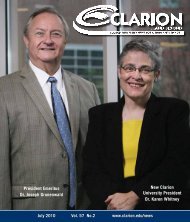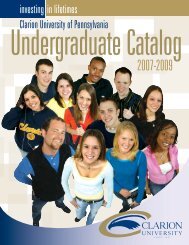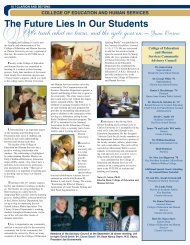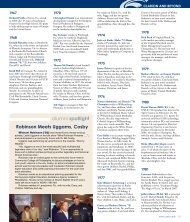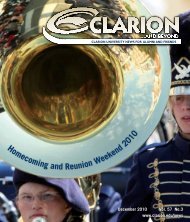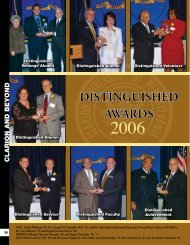Undergraduate - Clarion University
Undergraduate - Clarion University
Undergraduate - Clarion University
You also want an ePaper? Increase the reach of your titles
YUMPU automatically turns print PDFs into web optimized ePapers that Google loves.
150 <strong>Clarion</strong> <strong>University</strong> of Pennsylvania<br />
College of Business<br />
Administration<br />
ECON 323: APPLICATIONS OF BUSINESS AND ECONOMIC STATISTICS 3 s.h.<br />
Application of the statistical methods of probability, sampling, estimation, analysis of variance, regression, and correlation in<br />
the areas of economics and business. Prerequisite: ECON 222.<br />
ECON 342: ECONOMICS OF GOVERNMENT AND BUSINESS 3 s.h.<br />
A theoretical and empirical analysis of the effects of government policy on business behavior and economic efficiency in a<br />
market economy. Topics include: regulatory theory and policy; antitrust policy; social regulation of business and markets; and<br />
international trade policy. Prerequisites: ECON 211 and 212. Spring, biennially.<br />
ECON 351: LABOR ECONOMICS 3 s.h.<br />
Theory of the market is applied to labor. The evolution of labor law, collective bargaining, labor unions, and government policy<br />
are stressed. Prerequisites: ECON 211 and 212. Fall, annually.<br />
ECON 361: INTERNATIONAL ECONOMIC RELATIONS 3 s.h.<br />
Theory and practice of international trade. Balance of payments, foreign exchange, national commercial policies, international<br />
investment, and foreign aid are considered. Prerequisites: ECON 211 and 212. Fall, annually.<br />
ECON 363: ECONOMIC DEVELOPMENT 3 s.h.<br />
Survey of development models, development policies, and problems of development in developing countries. The course is<br />
aimed at identifying major economic questions relevant to less-developed economies and to showing how economic analysis can<br />
be used to further understanding of the obstacles to development and to formulating appropriate policies. Prerequisites: ECON 211<br />
and ECON 212. Spring, annually.<br />
ECON 370: MONEY AND BANKING 3 s.h.<br />
Nature and origins of money; the commercial banking system and money creation; central banking and the Federal Reserve<br />
System; monetary policy and domestic and international economic stability. Prerequisites: ECON 211 and 212. Spring, annually.<br />
ECON 371: PUBLIC FINANCE 3 s.h.<br />
Public sector activity and its impact upon resource allocation and income distribution. Topics include the theory of public<br />
expenditures, public choice, cost-benefit analysis, and fiscal federalism. The structure, incidence, and incentive effects of the<br />
personal income tax, corporate income tax, and various consumption and wealth taxes are investigated. Prerequisites: ECON 211<br />
and 212. Fall, annually.<br />
ECON 410: MANAGERIAL ECONOMICS 3 s.h.<br />
Use of economic analysis in the formulation of business policies. Decision theory and criteria for decision-making by the firm;<br />
output and “scale” decisions; linear programming; profits, production functions, and cost functions; competitive equilibrium (industry<br />
and firm); demand theory, pricing policies, capital budgeting, and investment; uncertainty; inventory management. Prerequisites:<br />
ECON 222, 310, and ACTG 252. On demand.<br />
ECON 461: TECHNOLOGY TRANSFER AND MULTINATIONAL CORPORATIONS 3 s.h.<br />
An applied analysis of the behavior and rationale for multinational corporations, with a special emphasis on the economics of<br />
technology transfer. Topics include: theory of the firm, foreign direct investment, intellectual property rights, market imperfections,<br />
international trade, international finance, economic development, and technology. Prerequisite: ECON 311. Biennially.<br />
ECON 470: BUSINESS CYCLES AND FORECASTING 3 s.h.<br />
Theories of business fluctuations; applications of modern income theory to business cycles; examination of business cycle<br />
indicators and forecasting techniques. Prerequisites: ECON 211 and 222, or consent of the instructor. Spring, annually.<br />
ECON 490: HISTORY OF ECONOMIC THOUGHT 3 s.h.<br />
Development of economic ideas from ancient times to the present. Emphasis upon the period from Adam Smith onward.<br />
Considers the economic and political environment in which ideas emerged as well as the leading economists advancing or defending<br />
the ideas. Prerequisites: ECON 211 and 212. Spring, annually.<br />
ECON 491: INDEPENDENT STUDIES IN ECONOMICS 1-3 s.h.<br />
Opportunity to explore, in depth, a problem or area of economics, according to the student’s interest, under the direction of a<br />
faculty member of the department. Prerequisites: 2.75 QPA and consent of both instructor and department chair. Maximum credit<br />
granted in ECON 491 is six credits.<br />
ECON 492: SPECIAL TOPICS IN ECONOMICS 3 s.h.<br />
An opportunity for students to investigate specific topics or current issues. Prerequisites depend upon the subject to be covered.<br />
General Studies Course<br />
Courses carrying the GS label are interdisciplinary in nature or are courses which do not fit into any of the usual academic disciplines.<br />
They are taken as free electives, as personal development and life skills under general education, or may with departmental approval<br />
be substituted for required courses in some majors.<br />
GS/ECON 140: CONSUMER ECONOMICS 3 s.h.<br />
Major aspects of personal financial management, including budgeting of income and expenditures, transactions, and relations<br />
with banks and other lending institutions, insurance and retirement plans, home ownership, personal taxes, savings, and investment<br />
plans. B.S.B.A. majors may apply this course only as a free elective. Alternate years.


